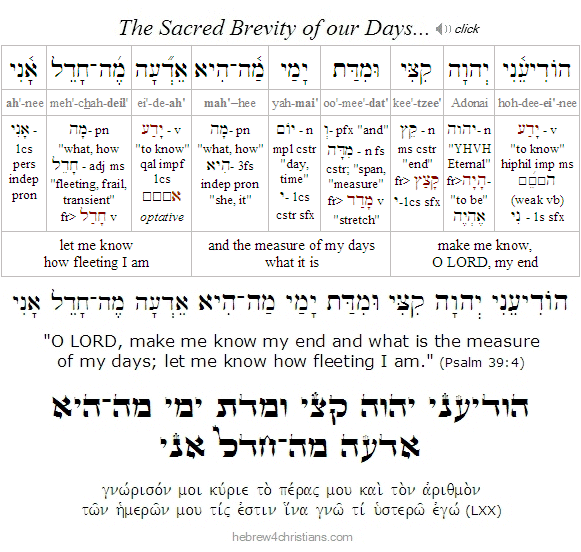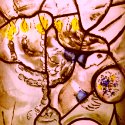|
In the Book of Isaiah we read: "The grass withers, the flower fades, but the word of our God will stand forever" (Isa. 40:8), which sets up a great contrast between olam ha-zeh and olam haba ã between this present world and the heavenly realm. Unlike the grass of the field that dries up or flowers that soon fade, the word of God stands forever. And despite the frailty of man and the inevitability of physical death, God's truth endures, which is a foundation upon which we can rest.
But how are metaphors that our lives are "like dried up grass" or a "withered flower" intended to comfort us? Do they not, on the contrary, lead us to regard our lives as vain and perhaps meaningless? Yes indeed. Our lives are empty and vain apart from God and His truth. If we find ourselves wincing over such images, it is perhaps time to reexamine the state of our faith: To the extent that we regard this world as our "home" we will find the transience of life to be tragic... For those who are seeking a heavenly habitation, the "City of God" and the fulfillment of the promise of Zion, the fleeting nature of this evil world is ultimately a form of consolation...
ææø¿æøÇææÂøçæ øÇæ æø¯ææø¡æ æÏøÇæÎø¥øÇæ
æø¥æøÇæø¥øñæˆ æø¡æøñæ æøñæøƒæøÇææ
æøçæø¯æÂø¡æ æøÑæøƒæø¡æøçæ æø¡æ øÇæ
hoôñdeeôñei'ôñnee ôñ Adonai ôñ keeôñtzee
ooôñmeeôñdat ôñ yaôñmai ôñ mah'-hee,
eiôñdeôñah ôñ meh-chaôñdeil ôñ a'ôñnee

"O LORD, make me to know my end
and what is the measure of my days;
let me know how quickly my life will pass"
(Psalm 39:4)


Note that the Hebrew word chadel (æø¡æøçæ) means "lacking" in the sense of being contingent, non-necessary, fleeting, impermanent, and so on. The KJV renders this word as "frail," since the word implies that compared to eternity, our lives are but a vapor or a shadow that quickly passes away. Therefore King David continues, "Behold, you have made my days a few handbreadths, and my lifetime is as nothing before you (æø¯æøÑæø¯æø¥øÇæ æø¯æøñæøÇæ æ øÑæø¯æø¥øÑæø¡). Surely all mankind stands as a mere vanity (æøÑæøÑæ)! Selah" (Psalm 39:5).
The theme of the transience of life is part of the message of Tishah B'Av. The Holy Temple, despite being the pride and joy of the Jewish people during the time of Solomon, went up in smoke, and the place (i.e., ha-makom: æøñæø¥ø¡æÏæø¿æ) where the LORD chose to "put His Name" vanished as if it had never been... Understand, then, that the expression of your highest ideals, your most celebrated achievements, likewise can be turned to smoke in an instant. This, then, is the sober message of Tishah B'Av, a "holiday" that teaches that all things will be "tossed into the oven" (Matt. 6:30), though the truth of God endures forever.
On the Jewish calendar, Tishah B'Av is "sandwiched" between the two times Moses received the tablets of the covenant, first during Shavuot and later, after a period of repentance, during Yom Kippur. This means that just two months after celebrating the Sinai revelation, we mourn for the destruction of the Temple and the beginning of our long exile; and two months later still, we celebrate national atonement and the restoration of the covenant during Yom Kippur. All this is prophetic, of course, since Shavuot recalls the ascension of our LORD and the giving of the Ruach HaKodesh (Holy Spirit); Tishah B'Av foretells of Israel's long exile and the "age of grace" extended to the Gentiles; and Yom Kippur foretells the coming atonement of the Jewish people at the end of the age, when Israel accepts Yeshua as their great High Priest of the New Covenant (Jer. 30:24).
 |
Tishah B'Av reminds us that this world is not our home, and that we are "strangers" and exiles here. The heart of faith is always in collision with this world. Yes, it is an affliction to wait for the LORD, a sort of "homesickness" of heart... The apostle Paul says our loneliness and alienation prepare for us an "eternal weight of glory" beyond all comparison, because we are not looking at what can be seen but at what cannot be seen. "For what can be seen is temporary, but what cannot be seen is eternal" (2 Cor. 4:17-18). Just as the "two-souled" man is unstable in all his ways, so the process of being "educated for eternity" means learning to focus our heart's passion and hope on the glory of heaven. "For where your treasure is, there will your heart be also."
Ultimately, the loss of "the place where God put His Name" was a deliberate affliction of His love for his people. The Sacred Name of God [ææææ] is formed from the words hayah ("He was"), hoveh ("He is"), and yihyeh ("He will be"): æø¡æø¡æ ææøÑæ æø¯æøÇæø¯æøÑæ, indicating that the LORD is always present, despite momentary appearances. Note that all the letters of the Name are "vowel letters," which mean they evoke breath and life. Indeed the first occurrence of the Name in Torah regards the inspiration of nishmat chayim (æ øÇæˋæø¯æøñæˆ æøñæø¥øÇææ), the "breath of life" in Adam (Gen. 2:4). The LORD is always present for you, breathing out life and hope...
Understand that every breath and every heartbeat is an irreplaceable gift given to you from God is sobering and helps focus the soul's affections. This is one of the "rock bottom" issues of life: There is a God, and you are not Him; and one day you will die and give account for the lease you were given on life... May it please God to help us "redeem the time," for the days are evil (Eph. 5:16; Col. 4:6). Amen.
|




